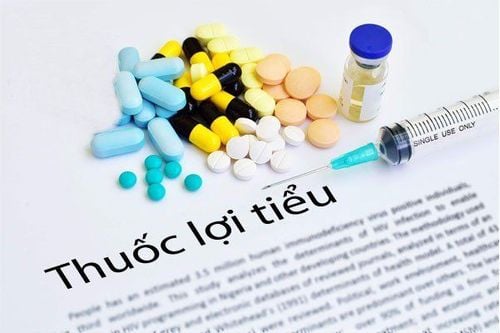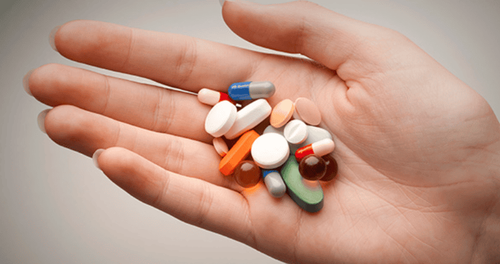This is an automatically translated article.
Idiopathic high blood pressure is a fairly common disease and it is also known as the silent killer. The treatment of the disease requires regular use of drugs, in which many groups of drugs with different mechanisms of action can be selected to treat hypertension.
1. What is essential hypertension?
Idiopathic high blood pressure is a condition in which blood pressure is higher than normal without a known cause, this condition is also known as primary hypertension.
According to statistics, up to 90% of people with hypertension are idiopathic. Although the exact cause of the disease is not known, essential hypertension can be related to many factors such as:
Genetic factors: If your family member has high blood pressure You are also at risk for this disease. The diet is not full of necessary nutrients, eating a lot of salt, consuming a lot of sodium and drinking a lot of alcohol. Chronic, frequent stress or anxiety also increases the risk of this condition. People who are inactive, less involved in physical activity. Overweight, obese, smoking. Have diabetes or lipid metabolism disorders. High blood pressure is a silent disease that causes few symptoms until it can cause complications. Therefore, to be able to know if you have this disease or not, you need to measure your blood pressure and check regularly. If left untreated, high blood pressure can lead to cardiovascular complications such as heart failure, atherosclerosis, myocardial infarction, stroke; renal and ocular complications.
2. Medicines for the treatment of essential hypertension
When you are diagnosed with essential hypertension you need to be on medication to treat it. Medication usually takes a lifetime. There are many different classes of antihypertensive drugs, as these agents target different hypertensive mechanisms that are often used in combination in clinical practice. Some drugs to treat essential hypertension include:
Diuretics Diuretics are drugs that increase the excretion of water and some electrolytes out through the urine, helping to reduce the volume of circulation. , reduce the burden on the heart and lower blood pressure. A diuretic commonly used in the treatment of blood pressure is a thiazide diuretic (hypothiazide) that removes water and sodium ions from the blood.
In addition, some other diuretics are also used in treatment such as loop diuretics (furosemide), potassium-sparing diuretics (spironolactone).
Calcium channel blockers Calcium is a substance that is essential for all the activities of muscle cells, including the heart muscle and the muscles surrounding blood vessels. muscle contraction. Calcium channel blockers inhibit the movement of calcium into muscle cells. The decrease in intracellular calcium reduces the contractility of the heart muscle (myocardial contraction) and blood vessel constriction, thereby lowering blood pressure. This blood pressure-lowering drug also relaxes the muscle cells located around the arteries, helping to lower blood pressure.
There are three main classes of calcium channel blockers. One of them is dihydropyridine, commonly used to treat high blood pressure that does not slow down the heart rate or cause an irregular heartbeat. These drugs include, Amlodipine, nicardipine, Nimodipine...
ACE inhibitors Inhibitors ACE inhibitors are antihypertensive drugs that work by inhibiting the action of angiotensin-converting enzyme (ACE), which is important in converting Angiotensin I to Angiotensin II. Angiotensin II is a chemical that has a very strong vasoconstrictor effect and is involved in water retention and salt retention, causing hypertension. ACE inhibitors help reduce the production of angiotensin II. As a result, the drug causes blood vessels not to constrict, but to widen or dilate, leading to a drop in blood pressure. Low blood pressure makes it easier for the heart to pump blood and can improve function for patients with symptomatic heart failure. Besides, this drug is also chosen for patients with diabetes to help slow the progression of kidney disease caused by diabetes.
Some drugs of this group include enalapril, coversyl(perindopril), captopril, Lisinopril, Trandolapril...
Angiotensin II receptor antagonists: This is a drug that has a competitive effect on binding to Angiotensin II at the receptor. AT1, prevents it from binding to its receptors to induce vasoconstriction. Some commonly used medications include Losartan (Cozaar), Telmisartan (Micardis), Irbesartan (Avapro), Valsartan (Diovan), Candesartan (Atacand), Eprosartan (Teveten) or Azilsartan (Edarbi).
Beta blockers Beta blockers are drugs that block neurotransmitters such as norepinephrine and epinephrine (adrenaline) from binding to both beta 1 and beta 2 receptors present in organs and muscles. , including the muscles surrounding the blood vessels. This binding will cause the effect of this transmitter to cause the blood vessels to narrow, the heart to weaken, to increase the heart rate.
By blocking these substances from binding to its receptor blocks the effects of norepinephrine and epinephrine. Beta blockers are a type of medication that lowers blood pressure by dilating blood vessels and reducing heart rate. They can cause airway constriction because beta receptors located in the lungs, if blocked, cause the muscles surrounding the airways to contract, with beta 1 receptors mainly in the airways. So, they have created an additional drug, these are selective inhibitors of beta 2 sympathomimetic receptors. Some commonly used drugs in this group include: Atenolol (Tenormin), Betaxolol, Bisoprolol fumarate (Zebeta), Carteolol, Carvedilol (Coreg), Metoprolol (Lopressor, ToprolXL), Nadolol (Corgard), Penbutolol, Pindolol, Propranolol...
Alpha Blockers The muscles around your blood vessels contain alpha receptors. Alpha receptors, like beta receptors, cause the muscles around the arteries to contract and narrow the artery lumen. By blocking the binding of neurotransmitters to alpha receptors, alpha blockers relax muscles and lower blood pressure. Some Alpha blockers include: Terazosin, Doxazosin (Cardura)
Alpha-beta blockers Both alpha-beta blockers work similarly to alpha blockers. In addition, these drugs slow the heart rate like beta blockers. As a result, blood vessels dilate, the heart rate slows, and blood pressure drops. Antihypertensives in this class include Carvedilol (Coreg) and Labetalol (Trandate).
Some other drugs Renin inhibitors, drugs acting on the central nervous system... are also one of the options to treat essential hypertension.
3. Measures to prevent and support the treatment of high blood pressure
Besides the use of antihypertensive drugs to reduce blood pressure. You need to have a reasonable diet and activities to help promote health, limit the use of many drugs. Some measures for you to prevent and support the treatment of essential hypertension include:
Reasonable diet: ensure adequate supply of potassium, but if using antihypertensive drugs of the ACE inhibitor group and Angiotensin antagonist AT1 receptor should limit potassium supplementation. Provide adequate trace elements, should reduce salt intake or reduce sodium intake (< 6 grams of salt equivalent to 1 teaspoon of salt per day). Note that sodium is not only found in table salt, but also in MSG and other preparations, so read the ingredients carefully before using. Increase the intake of green vegetables and fresh fruits. Limit foods that contain a lot of cholesterol and saturated fatty acids, reduce the amount of starch and sugar put into the body. Maintain a healthy weight with a body mass index (BMI) between 18.5 and 22.9 kg/m2. If you are overweight or obese, you should implement active weight loss with exercise and diet. Try to maintain a waist circumference below 90cm for men and below 80cm for women. Limit alcohol, beer, stimulants. Only 1 to 3 standard drinks should be stopped per day. Each standard glass contains 10g of alcohol. You should give up smoking or smoking pipes. This helps reduce the risk of many dangerous diseases. However, this can sometimes be difficult, you should have a community to support each other and get help from a doctor if needed. Increase physical activity at an appropriate level for each person: You should exercise, walk, yoga, nourish or exercise at a moderate level, regularly for about 30 to 60 minutes a day. Avoid anxiety or nervous tension; You should learn to manage stress. Besides, it is necessary to pay attention to getting enough sleep and proper relaxation and rest. Avoid letting the body get cold suddenly. Use blood pressure medication as directed. Should be combined with traditional medicine to reduce blood pressure to increase the effectiveness of treatment. Some traditional medicines can be used to reduce blood pressure, such as flowers, chrysanthemums, herbs, bud, etc. different effects and benefits. Therefore, the choice of treatment depends on your specific medical condition. This will be considered by the doctor based on the patient's current health status.
Follow Vinmec International General Hospital website to get more health, nutrition and beauty information to protect the health of yourself and your loved ones in your family.
Please dial HOTLINE for more information or register for an appointment HERE. Download MyVinmec app to make appointments faster and to manage your bookings easily.













